I fed NotebookLM a 218-page research paper on string theory and the podcast results were mind-blowing
Your fermions need to hear about my bosons

My latest NotebookLM podcast creation is deeper and more fascinating than anything I've ever created, and I bet it'll shock you, too.
I don't understand string theory. In fact, I bet there's fewer than 1% of the world that can speak cogently on the subject, but I am fascinated by the concept and have read a bit on it. Not enough to understand or explain it to you, but enough to have a steady and abiding curiosity.
AI, on the other hand, I think I understand and now regularly use as a tool. When Google released a recent NotebookLM update that includes, among other things, mind maps, I thought it was time to bring together something at the very outer edges of my understanding and this bleeding-edge artificial intelligence capability.
So I created a String Theory Podcast.
First, a tiny primer on NotebookLM. It is a powerful AI-based research tool in which you can upload sources, and it will turn them into summaries and extrapolated information in the form of text, podcasts, and visual guides like mind maps.
For me, the most fascinating bit has been the podcasts or "Audio Overviews", which churn out chatty audio conversations about virtually any topic you feed into them. I call it a podcast because the audio style walks a well-worn path of most popular podcast series. It's conversational, usually between two people, sometimes funny, and always accessible.
I've been wondering, though, if you can stretch the limits of the format with a topic so deep and, honestly, confusing, that the resulting podcast would be conversational nonsense.
My experiment, however, proved that while the current version of NotebookLM has its limits, it's far better at comprehending dense science bits than me and probably most people you or I know.
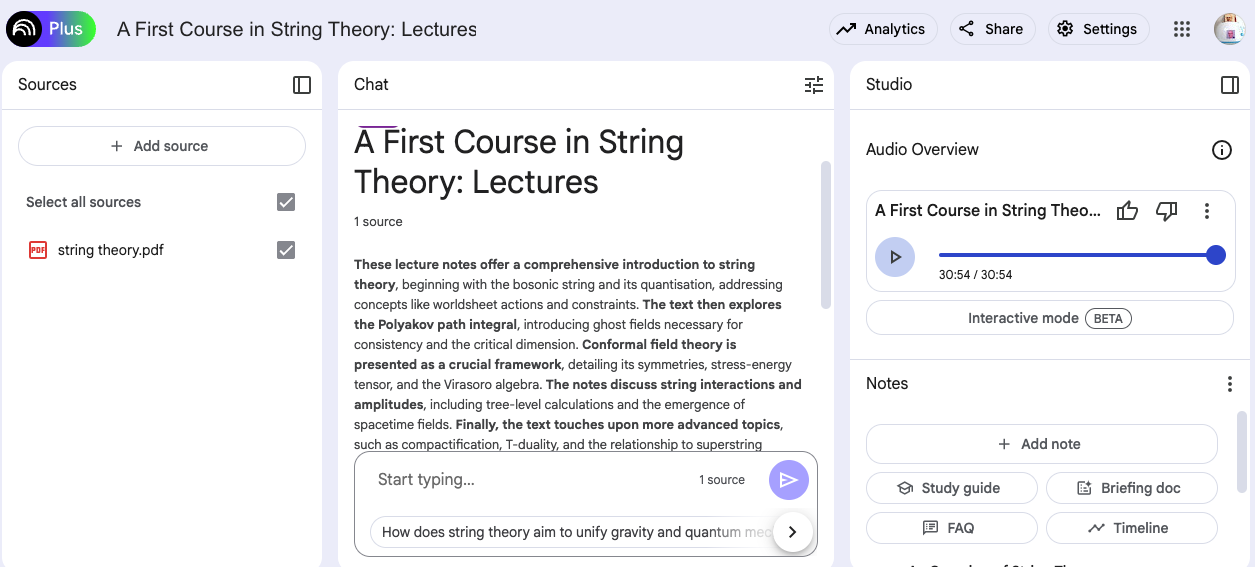
Weird science
Once I decided I wanted NotebookLM to help me with the topic, I went in search of string theory content (there's a lot more of it online than you might think), quickly stumbling on this 218-page research paper from 2009 by University of Cambridge researcher Dr. David Tong.
I scanned the doc and could tell that it was rich with string theory detail, and so far over my head, it probably resides somewhere near the rings of Saturn.
Imagine trying to read this document and make sense of it. Maybe if someone explained it to me, I'd understand. Maybe.
I downloaded the PDF and then fed it into NotebookLM, where I requested a podcast and a mind map.
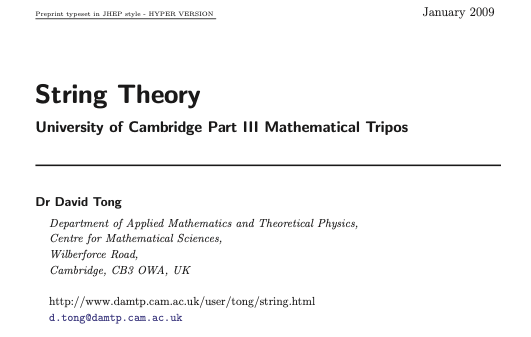
It took almost 30 minutes for NotebookLM to create the podcast, and I must admit, I was a little anxious as I opened it. What if this mass of detail on one of physics' most confounding topics overwhelmed Google's AI? Might the hosts just be babbling incoherently?
I shouldn't have worried.
I'd heard these podcast hosts before: a somewhat vanilla pair (a man and a woman) who banter casually, while making witty asides. In this case, they were trying to explain string theory to the uninitiated.
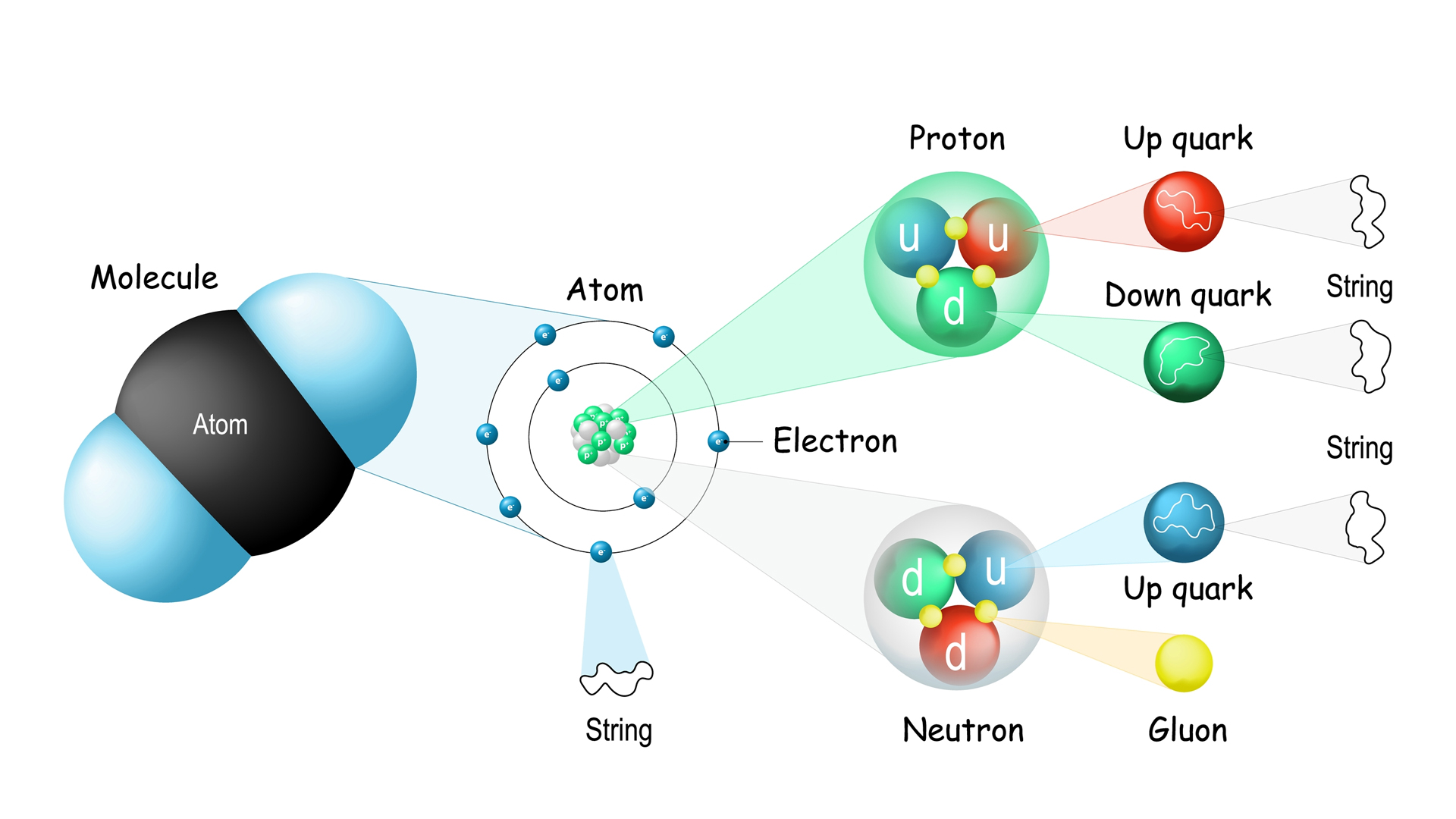
They started by talking about how they'd walk through the topic, covering bits like general relativity, quantum mechanics, and how, at least as of 2009, we had never directly observed these "strings". Earlier this month, some physicists claimed that they had, in fact, found the "first observational evidence supporting string theory." But I digress.
The hosts spoke like physics experts, but, where possible, in layman's terms. I quickly found myself wishing they had a guest. The podcast would've worked better if they were proxies for me, not understanding much at all, and had an AI-generated expert to interview.
Stringing it all together
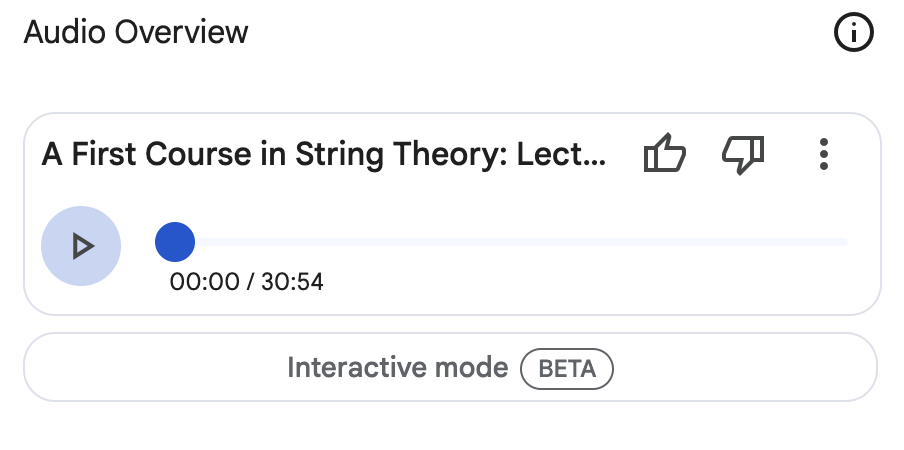
As the podcast progressed, the hosts dug into the details of string theory, specifically, the definition of a "string." They described them as tiny objects that vibrate and added, "all stuff in the universe comes from how tiny strings are vibrating."
Things got more complex from there, and while the AI podcast hosts' tone never changed, I struggled to follow along. I still can't tell you what "relativistic point particle viewed through Einstein's special relativity" really means. Though I did appreciate the analogy of "imagine a string moving through space time."
The AI hosts used various tricks to keep me engaged and not completely confused. The male host would, like a podcast parrot, often repeat a bit of what the female host had just explained, and use some decent analogies to try to make it relatable.
At times, the female host lapsed into what sounded like she was reading straight out of the research paper, but the male host was always there to pull her back to entertainment mode. He did a lot of chatty summarizing.
I felt like I reconnected to the whole thing when they explained how "string morphed into the theory of everything" and added, "bosons and fermions, partners in crime due to supersymmetry."
This was heavy
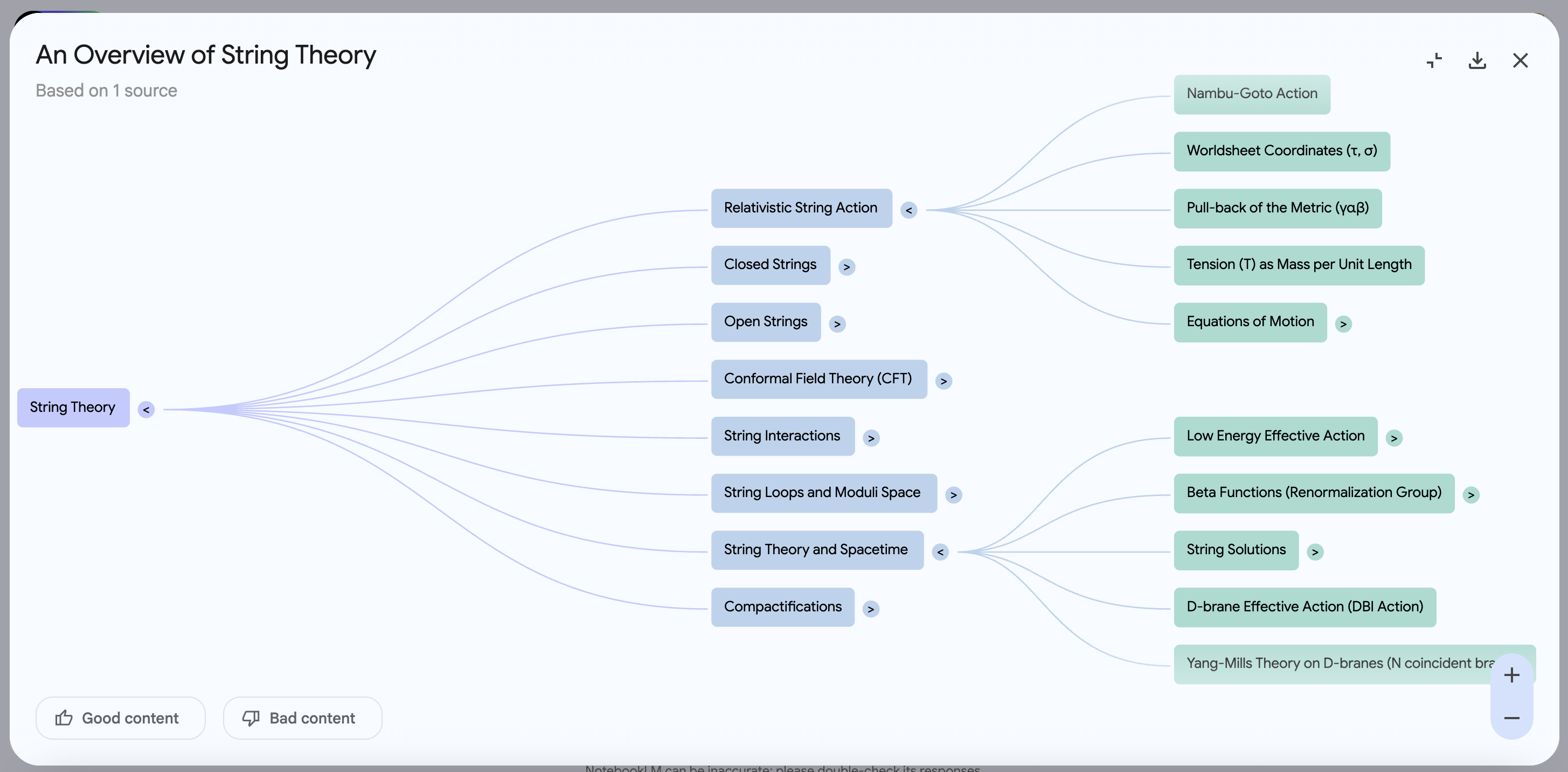
After 25 minutes of this, my head was stuffed to the point of bursting with those still-theoretical strings and spinning with terms such as "vertex operators" and "holomorphic."
I hoped for a grand and glorious summary at the end, but the podcast abruptly ended at almost 31 minutes. It cut off as if the hosts ran out of stream, ideas, or information, and walked away from the mics in frustration and without signing off.
In some ways, it feels like this is my fault. After all, I forced these SIMs to learn all this stuff and then explain it to me, because I could never do it. Maybe they got fed up.
I also checked out the mind maps, which are branching diagrams that can help you map out and represent complex topics like string theory. As you can imagine, the mind maps for this topic start simple but get increasingly complex as you expand each branch. Still, they're a nice study companion to the podcast.
It's also worth noting that I could enrich the podcast and mind maps with other research sources. I would simply add them into the sources panel in NotebookLM and rerun the "audio overview".
A real expert weighs in
For as much as I learned and as much as I trust the source material, I wondered about the podcast's accuracy. AI, even with solid information, can hallucinate, or at least misinterpret. I tried contacting the paper's author, Dr. Tong, but never heard back. So, I turned to another physics expert, Michael Lubell, Professor of Physics at City College of CUNY.
Dr. Lubell agreed to listen to the podcast and give me some feedback. A week later, he emailed me this brief note, "Just listened to the string theory podcast. Interestingly presented, but it requires a reasonable amount of expertise to follow it."
When I asked about any obvious errors, Lubell wrote, "Nothing obvious, but I’ve never done string theory research." Fair enough, but I'm willing to bet Lubell understands and knows more about string theory than I do.
Perhaps, the AI podcasters now know more about the subject than either of us.




























![[Webinar] AI Is Already Inside Your SaaS Stack — Learn How to Prevent the Next Silent Breach](https://blogger.googleusercontent.com/img/b/R29vZ2xl/AVvXsEiOWn65wd33dg2uO99NrtKbpYLfcepwOLidQDMls0HXKlA91k6HURluRA4WXgJRAZldEe1VReMQZyyYt1PgnoAn5JPpILsWlXIzmrBSs_TBoyPwO7hZrWouBg2-O3mdeoeSGY-l9_bsZB7vbpKjTSvG93zNytjxgTaMPqo9iq9Z5pGa05CJOs9uXpwHFT4/s1600/ai-cyber.jpg?#)














































































































































![[The AI Show Episode 144]: ChatGPT’s New Memory, Shopify CEO’s Leaked “AI First” Memo, Google Cloud Next Releases, o3 and o4-mini Coming Soon & Llama 4’s Rocky Launch](https://www.marketingaiinstitute.com/hubfs/ep%20144%20cover.png)


















































































































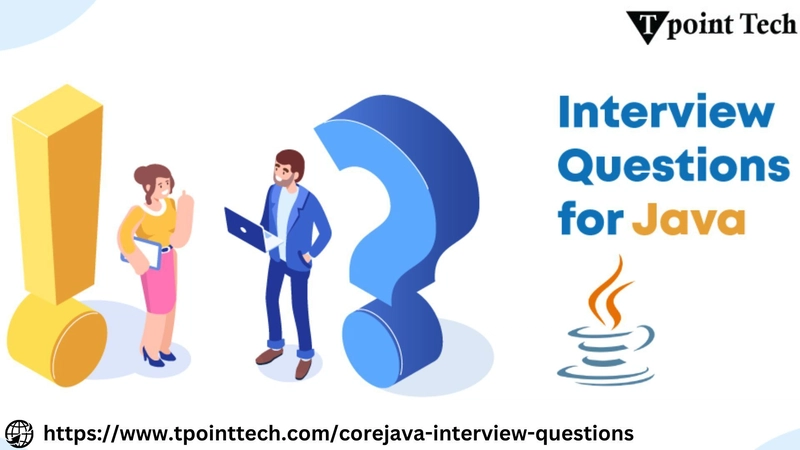

















































































![Rogue Company Elite tier list of best characters [April 2025]](https://media.pocketgamer.com/artwork/na-33136-1657102075/rogue-company-ios-android-tier-cover.jpg?#)








































































_Andreas_Prott_Alamy.jpg?width=1280&auto=webp&quality=80&disable=upscale#)



























































































![What’s new in Android’s April 2025 Google System Updates [U: 4/18]](https://i0.wp.com/9to5google.com/wp-content/uploads/sites/4/2025/01/google-play-services-3.jpg?resize=1200%2C628&quality=82&strip=all&ssl=1)










![Apple Watch Series 10 Back On Sale for $299! [Lowest Price Ever]](https://www.iclarified.com/images/news/96657/96657/96657-640.jpg)
![EU Postpones Apple App Store Fines Amid Tariff Negotiations [Report]](https://www.iclarified.com/images/news/97068/97068/97068-640.jpg)
![Apple Slips to Fifth in China's Smartphone Market with 9% Decline [Report]](https://www.iclarified.com/images/news/97065/97065/97065-640.jpg)



































































































































